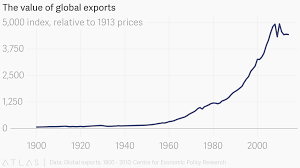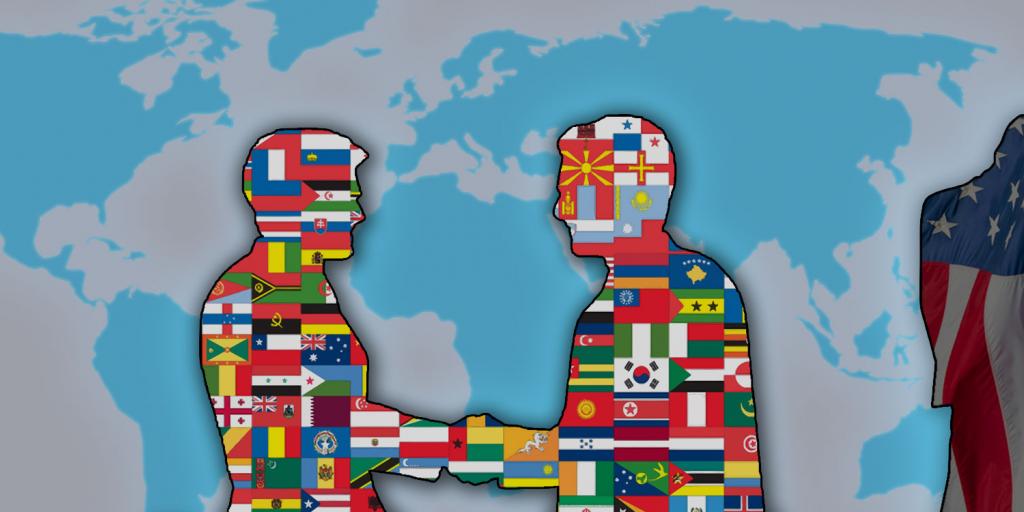International trade is the economic enterprise which bonds countries with shared demands and services. Some of the recurring and expected goods are food, industrial material such as automotive components and factorial machinery, vetements, miscellaneous technologies for both industrial and entertainment purposes. Countries appear to trade when they lack what is vital or needed for their community, in other words their consumers. It exposes people to goods and services which they cannot find in their country or it may lower the prices which would be a lot higher to buy domestically. Providing what the consumers want is a way of improving their life standards generally. Even though the term ‘’trade’’ and ‘’international trade’’ has been around for centuries, the rate of such kind of trade has increased tremendously in the recent years due to an intensification of a basic individuals needs and demands (As it can be seen from the graph 1.1.). To trade internationally, a country is to reach all the qualifications and pass the regulations of international trade organizations. And that might be difficult due to tariffs. International trade has three types: import trade, export trade and entrepot trade. Foreign aid can occur amidst the international trade as it is the action of assisting a country in any means possible and necessary. It is directed to developing, underdeveloped or undeveloped countries. There are various main and minor organizations whose whole purpose is solely to help foreign countries in need.

International trade can be approached in various aspects for the reason that it is highly favorable and in the mean time, disadvantageous for both underdeveloped and undeveloped countries. One distinct barrier is the existence of taxes on imports and exports which can be addressed as ‘’tariffs’’. This can also be seen as a con of globalization as it forbids having a healthy way of developing globally. The beneficiality of such import/export fees are debatable. Due to the fact that they only serve the ‘’more developed country’’ between the exporter and importer. Hence, the benefits of tariffs are uneven. While competition among the producers is a generally profitable effect, it can also bring the whole sector of production under the counter. When a product is released to a large group, you can’t expect to be the only profiteer. Even when a producer manages to get past the tariffs and bypass production theft, they might come across the risk of cultural differences. Those can affect a business poorly by all means. Another handicap which is especially directed at underdeveloped countries is that international trade creates a situation of dependence that drains the economy of the said countries slowly but surely. Along with economic dependence, there is the chance of ‘’political dependence’’. One example worth mentioning is the relationship of The Great Britain and India during the ‘’ Age of Discovery’’. As the British came to Indian lands for trade and ended up colonising the country (1824–1948). Another issue is extremely related with another important global topic which is ‘’ Global Warming and Natural Depletion’’. When a country makes great effort to produce and export its goods, it can deplete its resources tremendously. Even if it brings benefits in short term, it can eliminate the chances future businesses and environmental chances. It may give a hard time to local producers as the markets of the underdeveloped countries will be flooded with rather cheaply made products which are more approachable than the ones local producers can ever offer. Again in the long term, those kinds of markets will suffer immeasurably with the bringing of lower-class products.
The opportunities international trades provide can be separated into 3 main groups which have countless subgroups. Those main 3 are:
- Diplomatic Relations
- International Development
- Resistance to Economic Dangers
International development is a consequence and a benefit of trading internationally. In light of the fact that the companies get exposed to a bigger market, they need to develop their financial ways and quality of their products. This also comes with the expanded existence of competition and that situation encourages small businesses to step up and have their share of international benefit. This can lower the prices for many countries which cannot afford to buy from their domestic market ( a disadvantage can be seen in the second paragraph.) Countries share new technologies and techniques it also stabilizes the prices and brings a large variety og products and services.
Resistance to the risk of economic collapse provides you and your production safety, in case a country goes ‘’bankrupt’’, the businesses with branches that extends to other countries and other markets have increased chance of overcoming a possible financial crisis. This also decreases the reliance on domestic market and increases the opportunities greatly as they are indirectly proportional. While having all these advantages it may develop the relationship between the exporter and the importer. Those kind of relationships have the abiliy of developing into an alliance with time. One of the most ‘’outstanding’’ trade relationships is the relationship between United Nation of America and Canada. The two countries are each other’s number one buyer, Canada being USA’s biggest customer and USA being Canada’s biggest customer.
It is known for a fact that the rate of trade and products traded increases as the trade relationship ages. This rather beneficial situation may result in an alliance which is capable of standing for ages in case one country faces financial or confictual issues.
Foreign aid also has tremendous effect on international relationships. It is known for benefiting both the donor and recipient. The recipient can help its community ( mostly under the poverty line) increase their quality of life. Even though it is capable of easing the poverty, it may also put the recipient in debt, in case a loan was given. There is the slight chance of the aid not reaching where it should if the governing is corrupted. The donor would be appreciated by other countries and be seen as a charitable country. Nonetheless, if there is discrimination in the choosing process in which the countries to provide aid is determined, this may also backfire and result is a perishment in international relationships. It needs to be mentioned that aid can occur in several ways. Such as education for those who cannot achieve it and education is the only solution for long-term goals.
To summarize, a healthy trade relationship can be hard to obtain as a country should pass the tariffs, be independent enough, be able to protect its finance sector and choose its next move wisely. Aid in other hand should be made consciously and the flow of the money should be monitored. The countries should not be discriminated if the main aim is to help. The relationships will develop positively if both of these are done correctly.
https://www.trade.gov/ Accurate/Objective/Current/ It is an official website which is revisited to control the information given. Credible.
https://ourworldindata.org/exports/world-trade-exports-constant-prices_v1_850x600.svg Data from a reputable website which is reputable and current. Credible.
https://www.americanexpress.com/ Website of a reputable bank with current data. Authors are experts in their field.
https://www.thebalance.com/international-trade-pros-cons-effect-on-economy-3305579 A very current data with objective information. Reliable.

